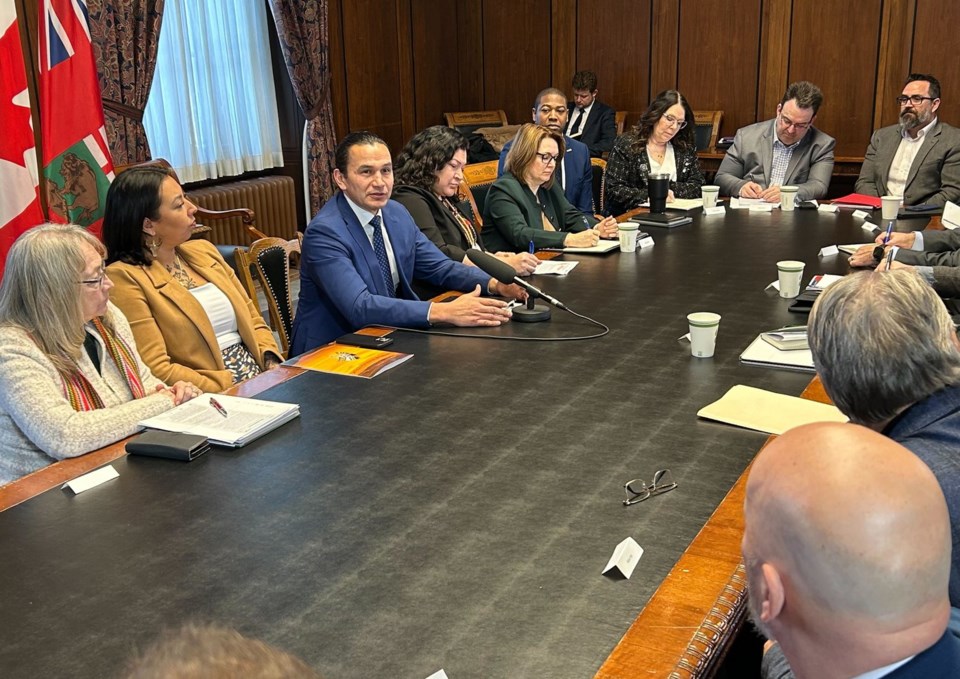WINNIPEG — The Manitoba government called off plans Monday, at least temporarily, to pull United States liquor products from store shelves as retaliation against threatened U.S. tariffs.
The move came after U.S. President Donald Trump announced he's holding off for 30 days on imposing broad tariffs on Canadian and Mexican goods. The tariffs were set to start Tuesday but Trump said he would give more time to reach an economic deal with Canada and Mexico.
"The fact that we, along with other provinces, were banning U.S. booze from the shelves — along with the counter-tariffs by the federal government that we supported — I think got the attention of the United States of America," Manitoba Premier Wab Kinew told reporters.
"This is a reprieve. Hopefully this is one that continues. Hopefully we don't see tariffs. But it's very clear that we have to start planning our economy to be more resilient and to be able to withstand this sort of situation."
The premier announced on the weekend plans to pull American-made products from government-run liquor stores on Tuesday and halt $80 million a year in purchases. The plan was to put products made in the U.S. in storage. It would not apply to U.S. brands made in Canada such as Budweiser and Miller Genuine Draft beers.
Kinew revealed another countermeasure Monday morning, saying his cabinet ministers were looking for ways to restrict U.S. companies from winning contracts to supply goods and services to the province.
"We have no quarrel with the American people. These are our friends. These are our relatives," Kinew said.
"But if their president is trying to take food out of our mouths, is trying to take jobs out of our province, then we have to stand up for ourselves."
Kinew made the remarks at the start of a meeting with members of his recently established U.S. Trade Council — a group that includes representatives of business, labour and Indigenous organizations as well as individual employers.
The head of the Manitoba Chambers of Commerce said there was widespread support among those at the meeting for the retaliatory measures the province has planned to date, along with a desire to be less reliant on trade with the U.S.
"Do we need to focus in terms of increasing our own productivity? Do we need to focus on growing our own local economy and investing in some of those key transportation elements that are going to help us get to new markets?" said Chuck Davidson, the group's president and chief executive officer.
"I think everything's on the table and the premier's been willing to listen and to take input, and I think that's something that's going to be key as we move forward."
Kinew has hinted at other steps the province is considering if tariffs are implemented, including tax deferrals for businesses hurt by U.S. tariffs and a formal ad campaign to encourage people to buy Canadian goods.
He was asked Monday whether the province would consider changing its electric-vehicle rebate program to exclude cars made by U.S.-based Tesla Inc., headed by Elon Musk.
"When it comes to who qualifies for the EV rebate, that's under consideration," he said.
Musk is serving in the Trump administration as a "special government employee."
Meanwhile, farmers in the province were bracing for the widespread negative impacts U.S. tariffs could have on the pork and canola industries.
The United States is Manitoba’s biggest partner for exporting pork, with producers shipping more than $450 million worth of pork south of the border.
“When you start to lose access to your largest market, there are job implications from that," said Cam Dahl, general manager of Manitoba Pork.
The U.S. is Canada’s No. 1 market for canola exports, with the total export value amounting to $8.6 billion in 2023, data from the Canola Council of Canada has found.
The Canola Council of Canada said tariffs would hurt.
“It (would) impact everything from the marketing options and prices that farmers may receive from their crop and extend to touch virtually all aspects of their operation, ultimately impacting cash flow and profitability,” said president Chris Davison.
This report by The Canadian Press was first published Feb. 3, 2025
-- with files from Brittany Hobson
Steve Lambert, The Canadian Press



